read this before you watch materialists
revisiting past lives (2023) and the genius of celine song
This contains spoilers for the 2023 movie Past Lives. Also post too long for email pls read in Substack :)
“You dream in a language that I can’t understand.”
Past Lives (2023), written & directed by Celine Song
If you’ve been on social media at all the past month, you would have seen promotion and discussions about A24’s new movie Materialists, written and directed by the wonderful and talented Celine Song—someone that I’m clearly normal about and not totally obsessed with.
There has been enough clever essays on the internet about the significance of Dakota Johnson’s luxury wardrobe despite her 80k annual salary, or the fact that Song is making yet another movie about love triangles (I say let the girls have a two-boys summer).
Fun fact: Her husband wrote Challengers, which is another infamous film about love triangles. Which, of course, could mean nothing.
But I come in peace (!!) and immense admiration for Celine’s works as a writer and director, so if you’re looking for a quick crash course on Celine Song and her directorial debut Past Lives, then you’re at the right place.
the na-young you remember does not exist here,
“Less a love story, more of a meditation on the what-ifs” is the words The Guardian used to describe Celine Song’s directorial debut Past Lives. The movie is built on fleeting moments of reality, so realistic that you might be able to find Noras and Hae Sung’s and Arthur’s in your own lives. Or maybe, you are Nora, and in that case, congratulations you probably cried your eyes out watching this.
The story follows Na Young from her childhood in Seoul, South Korea where she met and developed feelings for her classmate Hae Sung. Later, her family moved to Canada, she changed her name to Nora and the two lost contact. Nora became a writer, got married to an American named Arthur and started living in New York. Everything, which was thought to be safely buried in the past, came up surging back after Hae Sung decided to visit Nora in the US.
Now, you probably have detected themes of diaspora and immigrant identity, which was touched on beautifully in the film. I will not write more about this because I already had a pretty extensive post about it, but I will leave a quote from the movie here if you wanna weep.
인연 in-yun,
Past Lives talked about a Buddhist-derived concept called 인연 (inyun, or inyeon), which believes that every relationship you have in your current life is a result of thousands of interactions in thousands of past lives. If you brush past someone walking down the street, then you and that person might have been formal colleagues in a past life. If you have a best friend in this lifetime, then you and that person might have spent hundreds of lifetimes together. And if you are ever fortunate enough to get married, then you and that person have known each other for over 8000 lifetimes. 8000 layers of in-yun.
I am not religious enough to fully endorse in-yun, but I believe that love is marked by a sense of familiarity, not lust, not obsession, and certainly not a desire to conquer and dominate. Every great love story in my life (not necessarily mine, but that’s a story for another day) begins somewhat like this: we locked eyes across the room, and we felt a sense of relief, like “Oh, there you are.”
Love and relationships in Past Lives are calm and quiet: there is no big breakout moment, no love confessions in the rain, no thousands of roses on doorsteps. But I believe love is more profound not in spite of this lack, but because of it—love in Past Lives clings on religion, adult intimacy and loneliness, questions about destiny and fate. How do we know if we are in the right relationships? We don’t, and that’s the bittersweet truth that every adult has to learn one way or another.
and who you are is someone who leaves,
I am a blessed writer: every time I picked a topic to write about for, content relevant to that topic will start popping up everywhere on my feed, everywhere I look. This piece is no exception—because the moment I decided to write about Past Lives, whose topic is leaving and saying goodbyes, I came across two amazing essays of the same topic: Valerie club reticent’s you can just leave and Joan Didion’s Goodbye to All That. Recommended readings, both.
I recently finished André Leon Talley’s biography The Chiffon Trenches, and in that book he detailed the two most influential fallouts of his life: Karl Lagerfeld and Anna Wintour. He wrote that one day, Karl Lagerfeld just decided to “drop him,” stopped all contact and gifts and Chanel invitations. Anna Wintour also left in the same manner: she sorta ghosted him.
I was furious for him; I was expecting a big lashing out or at least some petty gossip about his former friends. But André, like Hae Sung, seemed to understand the nature of some people more than me. André accepted it and let it go. Hae Sung said he understood Nora leaving because who she is “is someone who leaves.”
On my 18th birthday, my mom texted me a long message that can be summarized like this: Don’t get married too soon. Always get your nails done. Don’t be scared to walk in the rain. And most importantly, someday someone might just get up and leave. It is up to you and your self-esteem to cope with that. You might curse them for years and drink too much, you might have to turn to religion or yoga or running a marathon, you might even have to move cities and continents to forget it, but you have to learn to cope with that.
My first thought was why do I have to be the one grieving and crashing out over someone else’s selfish action? I used to believe that leaving is the most cruel act anyone can do to anyone in their life. But I think I get it more now: people will leave, they leave because that’s who they are, and that has nothing to do with you. The question is: Do you love yourself enough to carry on?
Coming back to Past Lives: I understand why Nora left. The relationship between Nora and Hae Sung prior to their meeting in New York was one of potentials and what-ifs. What if Hae Sung turned out to be this person, what if Nora stayed in Seoul and became successful. Those what-ifs, even though they are beautiful and hopeful, is not enough. Nora realized that she has to take actions now for her real life instead of waiting around, shaping her life according to another person. Her reason for leaving is entirely hers, and it has nothing to do with Hae Sung. I think he also understands that.
But the problem with leaving with things unresolved is that you never know when they will resurface. That is the whole plot of Past Lives, and also of many other real lives.
you dream in a language that i can’t understand,
Culture is fascinating to me because it is something that cannot be translated—like how you cannot fully translate 인연 in-yun, a culturally Buddhist concept, into English. Yes you can somewhat convey its meaning, with lengthy English explanations that attempt to express the inexpressible cultural context, but it will only stop at that: attempts.
The conflict of Past Lives is centered around this very sentiment: the inexpressible, untranslatable. In some sense, Nora’s past life is her life in Korea before moving to New York City, before meeting her husband Arthur, a life that only her and Hae Sung can understand. This past life of hers is encoded in a secret language that Arthur can never understand, literally (he does not know Korean) and figuratively (he was not part of her childhood, unaware of her life in a different continent before New York).
One might say a human being is the most bare and vulnerable when they are sleeping, when they are dreaming. Arthur told Nora “You dream in a language that I can’t understand” after hearing her frequent sleep-talking in Korean. Which means, Nora still dreams in Korean, or a part of Nora’s vulnerability stays Korean—a part that Arthur could never reach.
It is implied that Arthur doubted his place in Nora’s heart, that he believed if someone of the same caliber as him appeared the same time that he did in Nora’s life, that Nora would have picked that someone to earn a US green card. This sensitive yet very American aspect of a marriage between an US citizen and a foreigner is rampant yet not widely talked about enough (except for overtly campy shows like 90 Days Fiance), and it’s not hard to understand why: no one wants to address this unromantic, almost transactional aspect of a marriage, yet it is mutually, quietly understood that a green card is part of the vows.
This level of delicate depictions of intercultural, interracial relationships is so rare in current media that after watching this scene, I immediately put Past Lives into my list of favorite movies of all time. Celine knows her way around with words, imagery, emotions, swirling them into a piece of visual media that is so melancholic that you can’t help but relate and sympathize with.
i just wanted to see you one more time,
Is love the last speck of childhood magic for adults? Adults, all grown up and disillusioned, desperately clinging to the only fairytale left called love?
Do you believe in past lives? For me, I am not even sure myself. Asking that is like asking if I believe in love, or ghosts: I cannot fully reject it, but many experiences have led me to have doubts about it. It is a concept, like many others, that adults have equated with childishness: you grow up and stop being fed yogurt and you move out to live alone and you stop believing in love and past lives and fairytales.
Why did Hae Sung look for Nora, traveling from Korea to America? Does he think something will happen, does he truly believe that he and Nora are interconnected through multiple past lives, this one being one of thousands? Or is it just a lie he and Nora clings to because they, like all people, cannot get over the what-ifs.
If only we truly have multiple lives and multiple chances. If only we don’t have to choose.
end,
I love Celine because she directs with a sense of emotionality and sensitivity that can only be found in an intelligent, experienced woman.
As Materialists is being released and having its moment, I hope the movie (and this piece) will inspire some of you to watch Past Lives, whether you’re revisiting the movie or experiencing it for the first time :)
Also writing this piece has made me realize how much I miss film commentary. I used to be a literature student, so this is taking me 5 years back. Should I do more analysis style like this?
Anyway, bye and speak soon :P




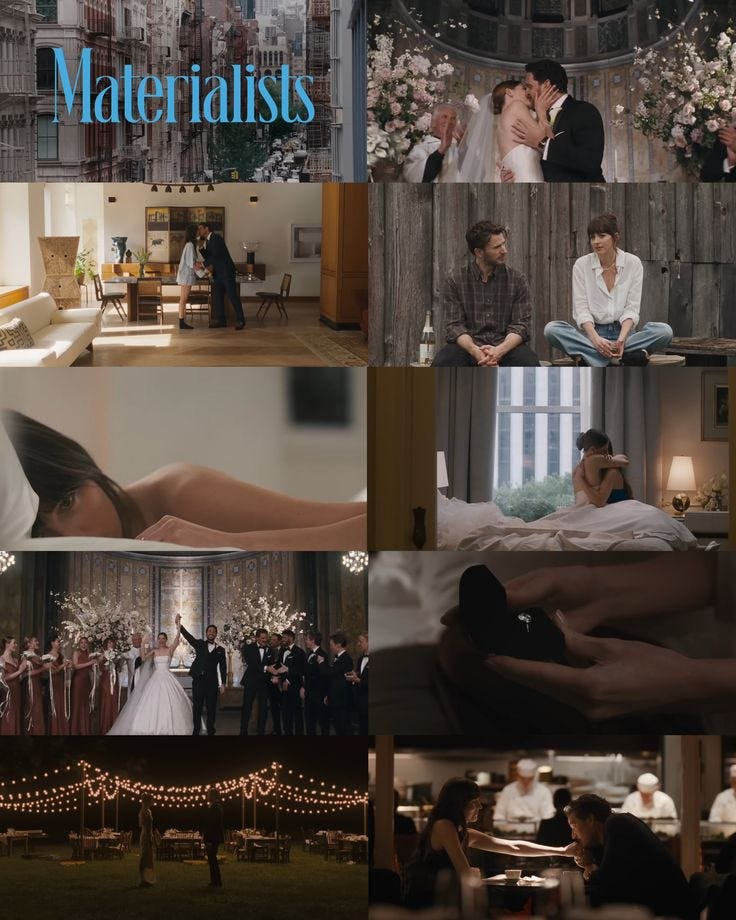
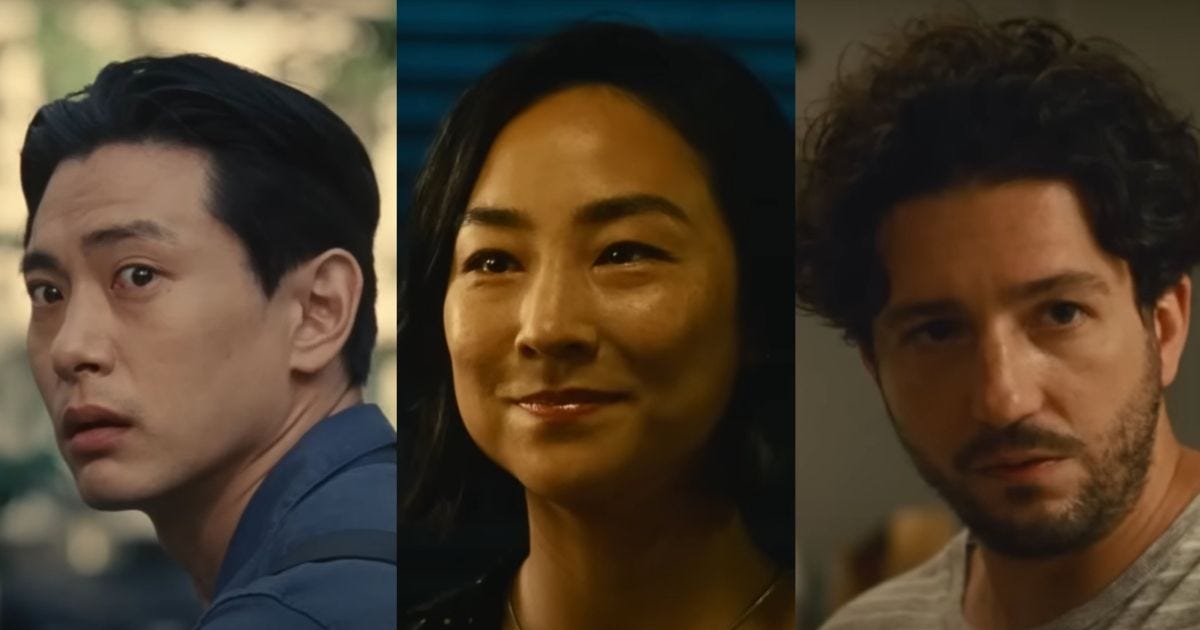

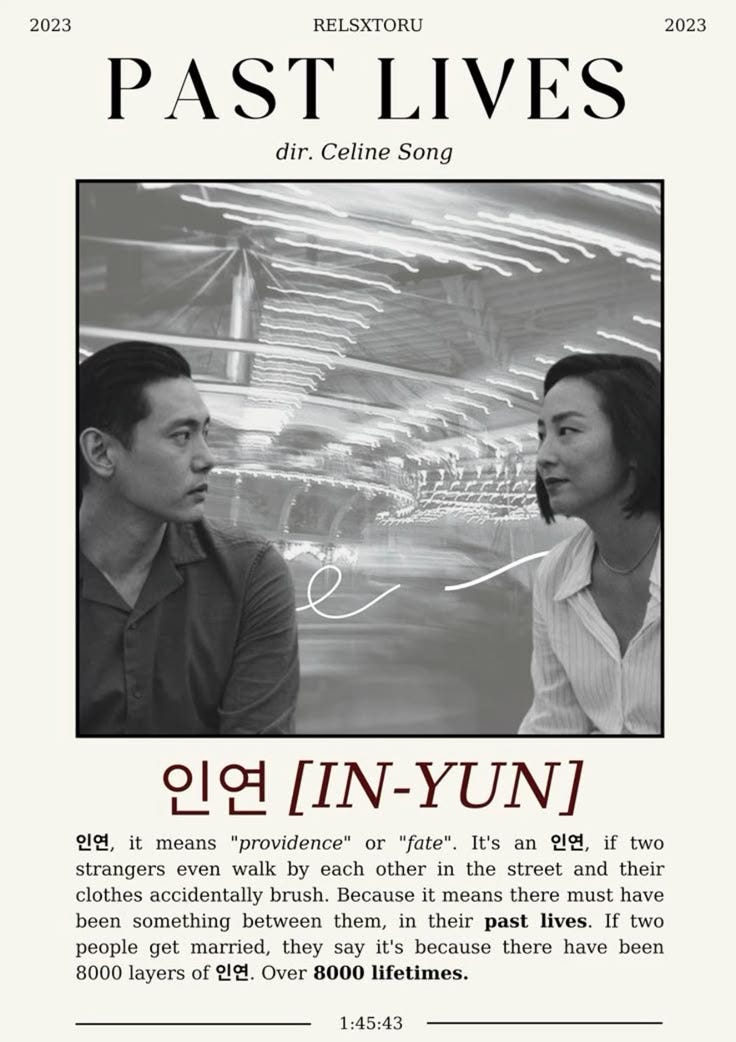
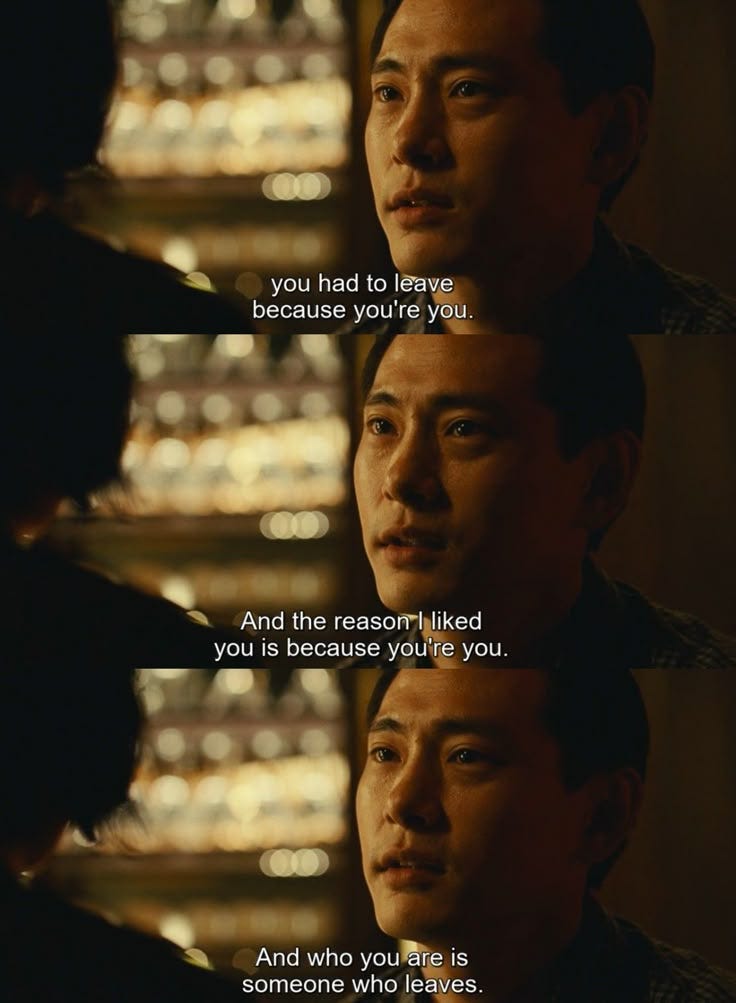
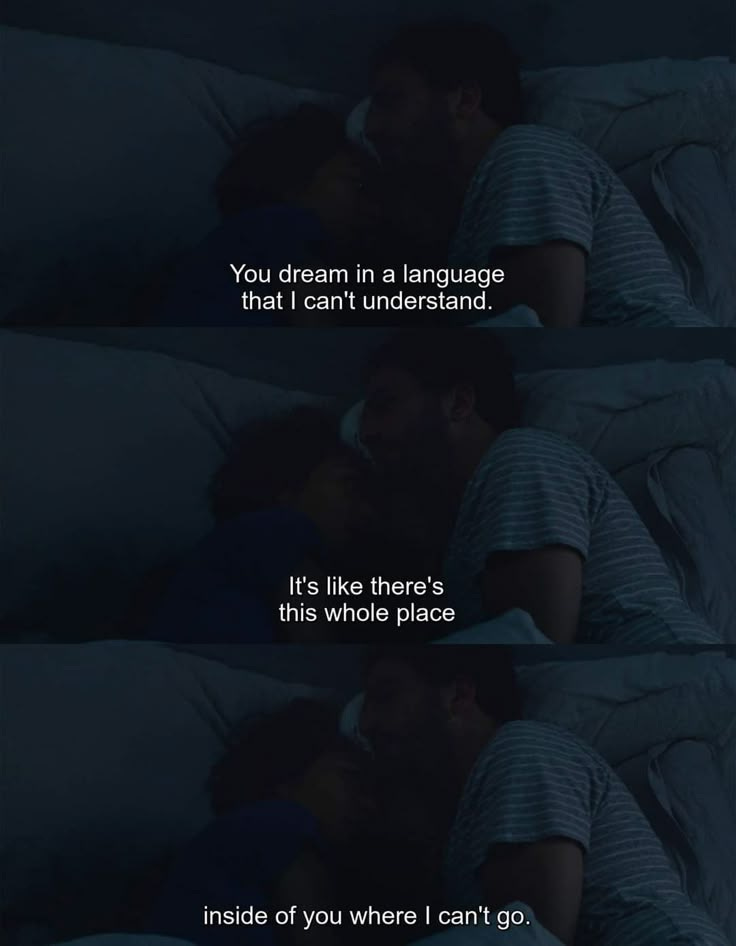
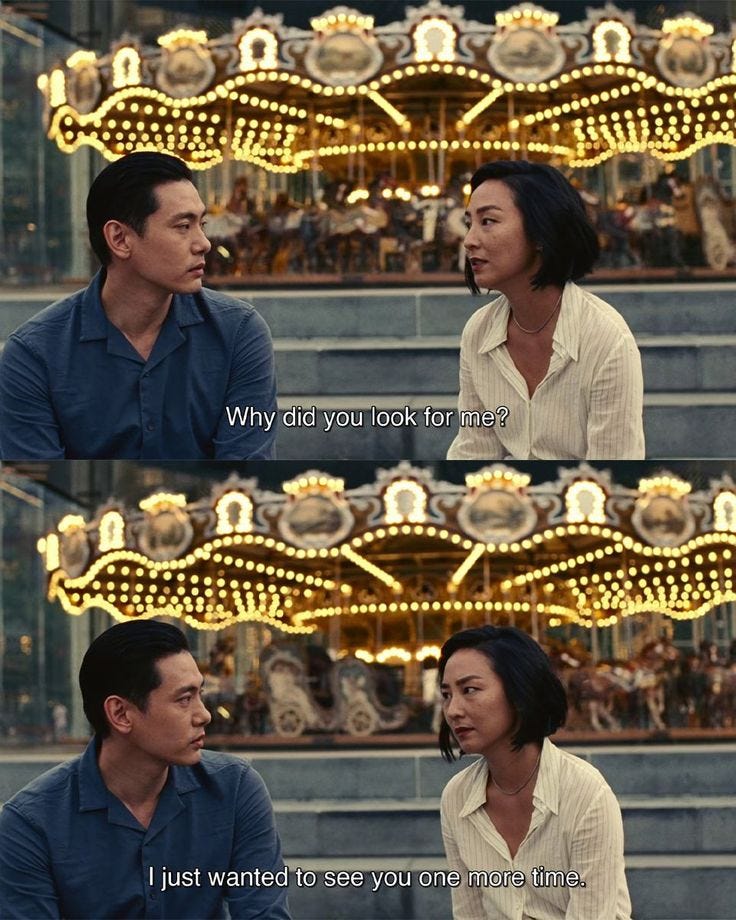
Completely agree with your reflections all around. I’m finding that after watching both that Celine plays with the ideas of possibilities which is why her characters feel v fleeting to me. Regardless her movies remain rich texts that I enjoy devouring.